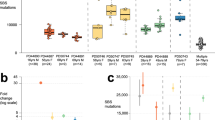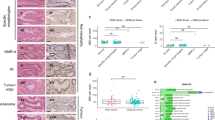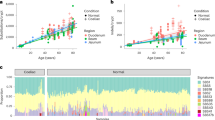Abstract
The DNA mismatch repair (MMR) system is primarily responsible for purging newly synthesized DNA of errors incurred during semi-conservative replication. Lesion recognition is initially carried out by one of two heterodimeric protein complexes, MutSα or MutSβ. While the former, comprised of MSH2 and MSH6, recognizes mispairs as well as short (1–2 nucleotide) insertions/deletions (IDLs), the latter, made up of MSH2 and MSH3, is primarily responsible for recognizing 2–6 nucleotide IDLs. As most of the functional information on these heterodimers is derived from in vitro studies, it was of interest to study the in vivo consequences of a lack of MutSα. To this end, Big Blue™ mice, that carry a lacI+ transgenic λ shuttle-phage mutational reporter, were crossed with Msh6−/− mice to evaluate the specific contribution of MutSα to genome integrity. Consistent with the importance of MutSα in lesion surveillance, small intestine epithelial cell DNA derived from lacI+ Msh6−/− mice exhibited striking increases (average of 41-fold) in spontaneous mutant frequencies. Furthermore, the lacI gene mutation spectrum was dominated by G:C to A:T transitions, highlighting the critical importance of the MutSα complex in suppressing this frequently observed type of spontaneous mutation.
This is a preview of subscription content, access via your institution
Access options
Subscribe to this journal
Receive 50 print issues and online access
$259.00 per year
only $5.18 per issue
Buy this article
- Purchase on Springer Link
- Instant access to full article PDF
Prices may be subject to local taxes which are calculated during checkout
Similar content being viewed by others
Abbreviations
- MMR:
-
mismatch repair
- MSH:
-
MutS homolog
- IDLs:
-
insertion/deletion loops
References
Acharya S, Wilson T, Gradia S, Kane MF, Guerrette S, Marsischky GT, Kolodner R, Fishel R . 1996 Proc. Natl. Acad. Sci. USA 93: 13629–13634
Andrew SE, Pownall S, Fox J, Hsiao L, Hambleton J, Penney JE, Kohler SW, Jirik FR . 1996 Mutat. Res. 357: 57–66
Andrew SE, Reitmair AH, Fox J, Hsiao L, Francis A, McKinnon M, Mak TW, Jirik FR . 1997 Oncogene 15: 123–129
Andrew SE, McKinnon M, Cheng BS, Francis A, Penney J, Reitmair AH, Mak TW, Jirik FR . 1998 Proc. Natl. Acad. Sci. USA 95: 1126–1130
Andrew SE, Xu XS, Baross-Francis A, Narayanan L, Milhausen K, Liskay RM, Jirik FR, Glazer PM . 2000 Carcinogenesis 21: 1291–1295
Aquilina G, Bignami M . 2001 J. Cell. Physiol. 187: 145–154
Baker SM, Bronner CE, Zhang L, Plug AW, Robatzek M, Warren G, Elliott EA, Yu J, Ashley T, Arnheim N, Flavell RA, Liskay RM . 1995 Cell 82: 309–319
Baker SM, Plug AW, Prolla TA, Bronner CE, Harris AC, Yao X, Christie DM, Monell C, Arnheim N, Bradley A, Ashley T, Liskay RM . 1996 Nat. Genet. 13: 336–342
Baross-Francis A, Andrew SE, Penney JE, Jirik FR . 1998 Proc. Natl. Acad. Sci. USA 95: 8739–8743
Baross-Francis A, Makhani N, Liskay RM, Jirik FR . 2001 Oncogene 20: 619–625
Buermeyer AB, Deschenes SM, Baker SM, Liskay RM . 1999 Annu. Rev. Genet. 33: 533–564
Cariello NF, Piegorsch WW, Adams WT, Skopek TR . 1994 Carcinogenesis 15: 2281–2285
Cariello NF, Gorelick NJ . 1996 Environ. Mol. Mutagen. 28: 397–404
Corpet F . 1988 Nucleic Acids Res. 16: 10881–10890
Cosentino L, Heddle JA . 2000 Mutat. Res. 454: 1–10
de Wind N, Dekker M, Berns A, Radman M, te Riele H . 1995 Cell 82: 321–330
de Wind N, Dekker M, Claij N, Jansen L, van Klink Y, Radman M, Riggins G, van der Valk M, van't Wout K, te Riele H . 1999 Nat. Genet. 23: 359–362
Drummond JT, Genschel J, Wolf E, Modrich P . 1997 Proc. Natl. Acad. Sci. USA 94: 10144–10149
Dycaico MJ, Provost GS, Kretz PL, Ransom SL, Moores JC, Short JM . 1994 Mutat. Res. 307: 461–478
Edelmann W, Cohen PE, Kane M, Lau K, Morrow B, Bennett S, Umar A, Kunkel T, Cattoretti G, Chaganti R, Pollard JW, Kolodner RD, Kucherlapati R . 1996 Cell 85: 1125–1134
Edelmann W, Umar A, Yang K, Heyer J, Kucherlapati M, Lia M, Kneitz B, Avdievich E, Fan K, Wong E, Crouse G, Kunkel T, Lipkin M, Kolodner RD, Kucherlapati R . 2000 Cancer Res. 60: 803–807
Edelmann W, Yang K, Umar A, Heyer J, Lau K, Fan K, Liedtke W, Cohen PE, Kane MF, Lipford JR, Yu N, Crouse GF, Pollard JW, Kunkel T, Lipkin M, Kolodner R, Kucherlapati R . 1997 Cell 91: 467–477
Genschel J, Littman SJ, Drummond JT, Modrich P . 1998 J. Biol. Chem. 273: 19895–19901
Jiricny J, Nystrom-Lahti M . 2000 Curr. Opin. Genet. Dev. 10: 157–161
Kolodner R . 1996 Genes. Dev. 10: 1433–1442
Kolodner RD, Tytell JD, Schmeits JL, Kane MF, Gupta RD, Weger J, Wahlberg S, Fox EA, Peel D, Ziogas A, Garber JE, Syngal S, Anton-Culver H, Li FP . 1999 Cancer Res. 59: 5068–5074
Kuraguchi M, Yang K, Wong E, Avdievich E, Fan K, Kolodner RD, Lipkin M, Brown AM, Kucherlapati R, Edelmann W . 2001 Cancer Res. 61: 7934–7942
Marra G, Iaccarino I, Lettieri T, Roscilli G, Delmastro P, Jiricny J . 1998 Proc. Natl. Acad. Sci. USA 95: 8568–8573
Marra G, Schar P . 1999 Biochem. J. 338: 1–13
Mirsalis JC, Provost GS, Matthews CD, Hamner RT, Schindler JE, O'Loughlin KG, MacGregor JT, Short JM . 1993 Mutagenesis 8: 265–271
Modrich P . 1991 Annu. Rev. Genet. 25: 229–253
Modrich P, Lahue R . 1996 Annu. Rev. Biochem. 65: 101–133
Monroe JJ, Manjanatha MG, Skopek TR . 2001 Mutat. Res. 476: 1–11
Narayanan L, Fritzell JA, Baker SM, Liskay RM, Glazer PM . 1997 Proc. Natl. Acad. Sci. USA 94: 3122–3127
Palombo F, Gallinari P, Iaccarino I, Lettieri T, Hughes M, D'Arrigo A, Truong O, Hsuan JJ, Jiricny J . 1995 Science 268: 1912–1914
Palombo F, Iaccarino I, Nakajima E, Ikejima M, Shimada T, Jiricny J . 1996 Curr. Biol. 6: 1181–1184
Peltomaki P . 2001 Hum. Mol. Genet. 10: 735–740
Provost GS, Kretz PL, Hamner RT, Matthews CD, Rogers BJ, Lundberg KS, Dycaico MJ, Short JM . 1993 Mutat. Res. 288: 133–149
Reitmair AH, Schmits R, Ewel A, Bapat B, Redston M, Mitri A, Waterhouse P, Mittrucker HW, Wakeham A, Liu B, Thomason A, Griesser H, Gallinger S, Ballhausen WG, Fishel R, Mak TW . 1995 Nat. Genet. 11: 64–70
Skopek T, Marino D, Kort K, Miller J, Trumbauer M, Gopal S, Chen H . 1998 Mutat. Res. 400: 77–88
Umar A, Risinger JI, Glaab WE, Tindall KR, Barrett JC, Kunkel TA . 1998 Genetics 148: 1637–1646
Wang TF, Kleckner N, Hunter N . 1999 Proc. Natl. Acad. Sci. USA 96: 13914–13919
Zhang S, Glickman BW, de Boer JG . 2001 Environ. Mol. Mutagen. 37: 141–146
Acknowledgements
We are grateful to S Lines for maintaining the animal colony and help in genotyping. This study was supported by the National Cancer Institute of Canada with funds from the Canadian Cancer Society (to FR Jirik), and by the Alberta Heritage Foundation for Medical Research (AHFMR) (to FR Jirik) and NIH grant number CA 76329 (to W Edelmann). FR Jirik was the recipient of AHFMR Scientist and Canada Research Chair awards.
Author information
Authors and Affiliations
Corresponding author
Rights and permissions
About this article
Cite this article
Mark, S., Sandercock, L., Luchman, H. et al. Elevated mutant frequencies and predominance of G:C to A:T transition mutations in Msh6−/− small intestinal epithelium. Oncogene 21, 7126–7130 (2002). https://doi.org/10.1038/sj.onc.1205861
Received:
Revised:
Accepted:
Published:
Issue Date:
DOI: https://doi.org/10.1038/sj.onc.1205861
Keywords
This article is cited by
-
Integrated exome and transcriptome sequencing reveals ZAK isoform usage in gastric cancer
Nature Communications (2014)
-
Gene expression profiling of Naïve sheep genetically resistant and susceptible to gastrointestinal nematodes
BMC Genomics (2006)
-
Mutational-reporter transgenes rescued from mice lacking either Mgmt, or both Mgmt and Msh6 suggest that O6-alkylguanine-induced miscoding does not contribute to the spontaneous mutational spectrum
Oncogene (2004)



